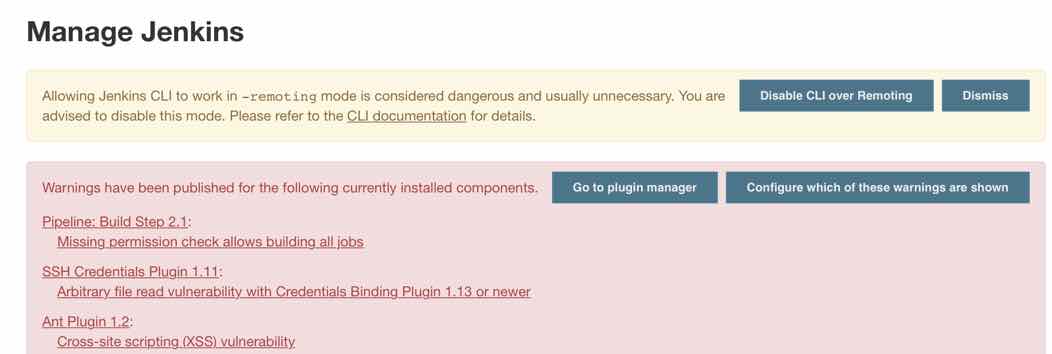I needed to convert a freestyle job to a pipeline job for “Automating your Ci/CD Stack with Java and Groovy” Hands On Lab at Oracle Code One. It’s a really simple project, but it is still a pain to convert by hand.
I had read about the Convert to Pipeline plugin so decide to give it a shot. It’s easy enough to install a plugin.
Generated Pipeline
Below is what got generated. While I’d like to assume that credentials binding isn’t in wide use, that one didn’t surprise me. In hindsight, it makes sense because the credentials binding would need to wrap the Gradle block. I was surprised that Gradle wasn’t supported.
I am glad that the tool leaves comments for what you need to do by hand.
// Powered by Infostretch
timestamps {
node () {
stage ('osprey - Checkout') {
checkout([$class: 'GitSCM', branches: [[name: '*/master']], doGenerateSubmoduleConfigurations: false, extensions: [], submoduleCfg: [], userRemoteConfigs: [[credentialsId: '', url: 'https://github.com/boyarsky/OracleCodeOne2018-HOL-Automating-Stack-Groovy.git']]])
}
stage ('osprey - Build') {
// Unable to convert a build step referring to "org.jenkinsci.plugins.credentialsbinding.impl.SecretBuildWrapper". Please verify and convert manually if required.
// Unable to convert a build step referring to "hudson.plugins.gradle.Gradle". Please verify and convert manually if required.
// JUnit Results
junit 'osprey-project/build/test-results/test/*.xml'
}
}
}
Using the pipeline generator
On the pipeline job, you can click the “pipeline syntax” link. It opens a new browser tab with a pull down for common pipeline operations.
Credentials
I choose “withCredentials”, entered the variable names and selected the credential from the pull down. Then I clicked “Generate Pipeline Script” and got:
withCredentials([usernamePassword(credentialsId: 'nexus', passwordVariable: 'nexusPassword', usernameVariable: 'nexusUserName')]) {
// some block
}
Gradle
That brings us to Gradle. As far as I can tell, there are only objects for Gradle if you are using Artifactory. I am using the gradle wrapper though, so I followed the advice of this Stack Overflow post and just called gradlew.
withCredentials([usernamePassword(credentialsId: 'nexus', passwordVariable: 'nexusPassword', usernameVariable: 'nexusUserName')]) {
sh "./osprey-project/gradlew clean build -b osprey-project/build.gradle -PnexusBaseUrl=http://nexus:8081 -PnexusUserName=${nexusUserName} -PnexusPassword=${nexusPassword}"
}
I decided to separate the publish step into a different stage and rename the stages as well. Resulting in:
// Powered by Infostretch
timestamps {
node () {
stage ('Checkout') {
checkout([$class: 'GitSCM', branches: [[name: '*/master']], doGenerateSubmoduleConfigurations: false, extensions: [], submoduleCfg: [], userRemoteConfigs: [[credentialsId: '', url: 'https://github.com/boyarsky/OracleCodeOne2018-HOL-Automating-Stack-Groovy.git']]])
}
stage ('Build') {
withCredentials([usernamePassword(credentialsId: 'nexus', passwordVariable: 'nexusPassword', usernameVariable: 'nexusUserName')]) {
sh "./osprey-project/gradlew clean build -b osprey-project/build.gradle -PnexusBaseUrl=http://nexus:8081 -PnexusUserName=${nexusUserName} -PnexusPassword=${nexusPassword}"
}
// JUnit Results
junit 'osprey-project/build/test-results/test/*.xml'
}
stage ('Publish') {
withCredentials([usernamePassword(credentialsId: 'nexus', passwordVariable: 'nexusPassword', usernameVariable: 'nexusUserName')]) {
sh "./osprey-project/gradlew publish -b osprey-project/build.gradle -PnexusBaseUrl=http://nexus:8081 -PnexusUserName=${nexusUserName} -PnexusPassword=${nexusPassword}"
}
}
}
}
Note: My actual build file was bigger. The parts outside the pipeline (ex: project security settings) got preserved.

